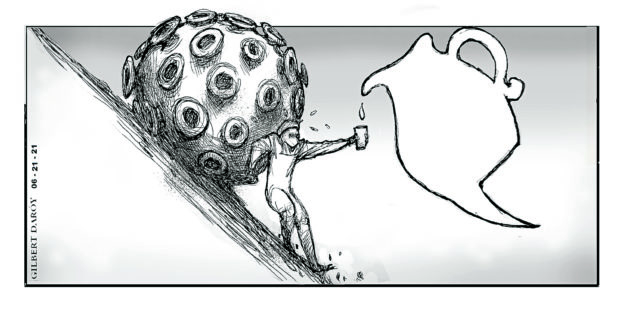Sacrificial lambs

Despite being the most indispensable sector in the ongoing pandemic, medical frontline workers have also been among the most taken for granted, repeatedly getting the short end of the stick in the government’s COVID-19 response. From lack of proper equipment to help them fight the virus at the onset, to delays in their vaccination against the coronavirus, to nonpayment of salaries and allowances, there appears to be no shortage of government failures to address the concerns of health care workers (HCWs) and make their situation less taxing on their health, safety, and well-being.
Early this month, nurses at the Philippine General Hospital (PGH) — the largest COVID-19 referral center in the country — demanded the release of at least P43 million worth of salary differentials owed them since January last year. The delay was due to the impasse caused by a controversial circular issued in July last year by the Department of Budget and Management (DBM) but made retroactive to January of the same year, raising the salaries of entry-level nurses but effectively demoting senior nurses and putting a freeze on increases in their pay. Nurses objected to this modification as unfair to their colleagues.
The circular was rectified by a memorandum issued on June 1 and signed by Executive Secretary Salvador Medialdea that ordered the DBM and the Department of Health (DOH) to go ahead with the salary hike for entry-level nurses and retain salaries for the other senior positions. In its memorandum, the Palace said it recognized “the indispensable and essential role of public health nurses in ensuring a functioning health-care system in the country, especially exemplified and highlighted during the current COVID-19 pandemic.”
Warm words, but it’s the pay that puts food on the table. Unfortunately, nurses who faced demotion yet stayed on the job fear they might not be able to get the salary differential now due them because of what the government claims is a lack of funding. The latest word from the Palace is that either the funds could be sourced from the DOH’s budget this year or included in next year’s allocation.
That could be a problem, considering that the DOH already owes HCWs millions in allowances this year. Workers in public hospitals learned also this month that the DOH had already “repurposed” a portion of the funds amounting to about P300 million that had been earmarked for their accommodations, meals, and transportation in the last quarter of the year—meaning the department spent the money meant for HCWs on other COVID-19-related items.
Health Undersecretary Leopoldo Vega hastened to say that the funds were not “repurposed” but was supposedly transferred to the quick response fund and used to pay for the benefits of HCWs who were infected or died from COVID-19, as well as the salaries of additional staff in surge areas, and for biosurveillance activities. “The funds provided for the DOH were intended for COVID-19 response and not solely for the provision of accommodations, transportation and meals [for] our health-care workers,” the department said.
But that leaves affected hospital employees wondering if they could still claim the money that they were told were earmarked for their benefit. According to Alliance of Health Workers president Robert Mendoza, the amount missing could even go beyond P300 million, since this only covered eight of the 72 DOH-retained hospitals. Under the Bayanihan 2 law, these 72 hospitals were supposed to receive a total of P2 billion worth of allowances from September to December 2020. However, the DOH asked the hospitals to return the unused portion of the budget in December last year before the law was to expire. When the Bayanihan 2 law was extended until June 30 this year, HCWs asked that the benefits be converted into their cash equivalent, which the Office of the President granted. Only then did they learn that the DOH had used the money for other purposes.
“Why did DOH use it for COVID-19 related activities? Is this how you treat and value us, the modern-day heroes?” asked Sean Velchez, president of the National Orthopedic Hospital Workers Union. It was “disheartening,” he added, to learn that they could no longer receive the money that was rightfully theirs. He cited a DOH letter sent to the Philippine Orthopedic Center, one of the 72 hospitals, that said there was no “additional funding or budget request” to cover the said benefits.
“We refuse to be sacrificial lambs to this pandemic,” the Filipino Nurses United said last March, as it urged the government to reassess its response to the COVID-19 pandemic — a call that has been on refrain since last year. “Nurses in government and private hospitals handle patients and assume workload that have stretched their bodies, brains and emotions to the limits. We are humans and we need to be cared for.”




















